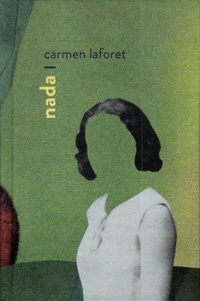Nada by Carmen Laforet is a thrilling, chaotic, and apocalyptic read. Andrea, an  18 year old young woman, guides us through her adventure to live with her terror-filled family in Barcelona while she attends university. The book begins with her first interactions and impressions of her deranged family members on Calle de Aribau, who all seem to hate each other and fight constantly. The house, described almost as a haunted house, is dark, ghostly, and somber. In the first chapter, we are introduced to the central characters in the book: Andrea’s aunt and uncles — Angustias, Juan, and Roman— her decrepit “Mama” (grandmother) who appears to have dementia, Gloria (Juan’s wife) and their baby, and Antonia, the erratic housemaid.
18 year old young woman, guides us through her adventure to live with her terror-filled family in Barcelona while she attends university. The book begins with her first interactions and impressions of her deranged family members on Calle de Aribau, who all seem to hate each other and fight constantly. The house, described almost as a haunted house, is dark, ghostly, and somber. In the first chapter, we are introduced to the central characters in the book: Andrea’s aunt and uncles — Angustias, Juan, and Roman— her decrepit “Mama” (grandmother) who appears to have dementia, Gloria (Juan’s wife) and their baby, and Antonia, the erratic housemaid.
Though there are many characters, I wanted to briefly highlight two women with which I felt had a significant impact on Andrea. Angustias, Andrea’s authoritative aunt, seems to take on a certain hatred for the young narrator as well as most of the other family members, and we even see her implying killing Andrea on page 80: “If I’d gotten hold of you when you were younger, I’d have beaten you to death”. Gloria is a central character in the story, and we learn a lot about her pretty early on in the book. Andrea seems to create a bond with Gloria and there is an essence of protection in their relationship as her husband, Juan, is openly abusive and overbearing, which Andrea even observes one night in chapter 8.
As Andrea navigates the craziness of her family, she seems to cope through laughter and comedy. On page 107, we take a dive into Andrea’s dark thoughts where she speaks about a certain “desire” to bite Gloria and even insinuates cannibalism, but readily catches herself and “[laughs] at [her] own monstrous thoughts” (107). This seems to be Andrea’s coping mechanism, as it comes up many times throughout the novel. The humour with which we experience through the narration of Andrea adds a certain edge to the story while also keeping readers engaged with Andrea’s bizarre interactions and adventures.
Throughout the book it seems as if Andrea struggles to fit in and has a desire for lasting comfort. This is difficult to find in Calle de Aribau, as her family is sporadic and abusive towards one another. However, she appears to find this within her friendship with Ena and Ena’s family, as well as Pons. As someone who speaks French I know that “pons”, although spelled slightly differently, means “bridge” in English. I believe this was a strategic choice by Laforet as the character Pons was a bridge for which Andrea was able to seek comfort and freedom from her family.
My question to my classmates is: what do you think the significance of the title, “Nada” (meaning “nothing”), is to the novel? This is something I have thought about, but would like to hear my classmates’ ideas and opinions!
